Filter by

Migrant Protest: Interactive Dynamics in Precarious Mobilizations
Migrant protest has proliferated worldwide in the last two decades, explicitly posing questions of identity, rights, and equality in a globalized world. Nonetheless, such mobilizations are considered anomalies in social movement studies, and political sociology more broadly, due to 'weak interests' and a particularly disadvantageous position of 'outsiders' to claim rights connected to citizensh…
- Edition
- -
- ISBN/ISSN
- 9789048550197
- Collation
- -
- Series Title
- -
- Call Number
- 351.81 STE m
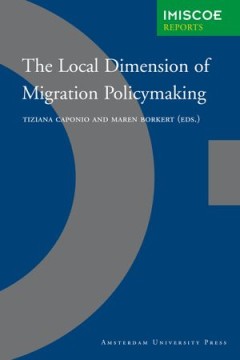
The Local Dimension of Migration Policymaking
This book prompts a fresh look on immigrant integration policy. Revealing just where immigrants and their receiving societies interact everyday, it shows how societal inclusion is administered and produced at a local level. The studies presented focus on three issue areas of migration policy - citizenship, welfare services and religious diversity - and consider cities in very different national…
- Edition
- -
- ISBN/ISSN
- 9789089642325
- Collation
- -
- Series Title
- -
- Call Number
- 320 CAP l

Land, Life, and Emotional Landscapes at the Margins of Bangladesh
Drawing on two years of ethnographic research in the north-eastern borderlands of Bangladesh, this book focuses on the everyday struggles of indigenous farmers threatened with losing their land due to such state programmes as the realignment of the national border, ecotourism, social forestry and the establishment of a military cantonment. In implementing these programmes, state actors challeng…
- Edition
- -
- ISBN/ISSN
- 9789048553365
- Collation
- -
- Series Title
- -
- Call Number
- 320 HOL l
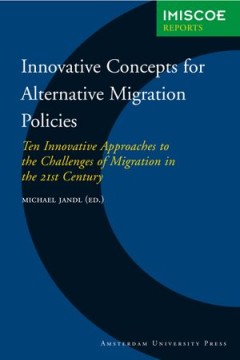
Innovative Concepts for Alternative Migration Policies
Based on the strengths of combined ideas from migration researchers, policy experts, and representatives of international organisations, this timely volume provides eight basic principles for the design of innovative migration policy. Presents new proposals for innovative migration policies.
- Edition
- -
- ISBN/ISSN
- 9789053569900
- Collation
- -
- Series Title
- -
- Call Number
- 320 INN i
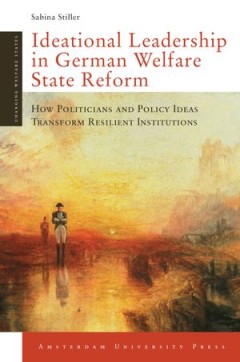
Ideational Leadership in German Welfare State Reform
The author of this innovative study argues that key politicians and their policy ideas, through "ideational leadership", have played an important role in the passing of structural reforms in the change-resistant German welfare state. This argument is based on in-depth case studies of individual reforms in health care, pensions and unemployment insurance since the early 1990s as well as a concis…
- Edition
- -
- ISBN/ISSN
- 9789089641861
- Collation
- -
- Series Title
- -
- Call Number
- 320 STI i
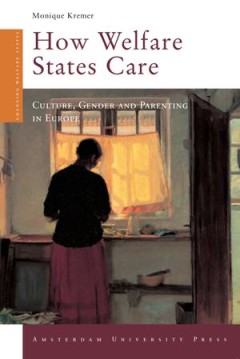
How Welfare States Care
A social revolution has taken place in Europe. Women's employment patterns changed drastically the last decades. But they are still different across Europe. Welfare state scholars often presume that diversity and change in women's employment across Europe is based on financial (dis) incentive structures embedded in welfare states. This book shows, by in depth analyses of women's (and men's) emp…
- Edition
- -
- ISBN/ISSN
- 9789053569757
- Collation
- -
- Series Title
- -
- Call Number
- 320 KRE h

Pioneers, Settlers, Aliens, Exiles: The decolonisation of white identity in Z…
What did the future hold for Rhodesia’s white population at the end of a bloody armed conflict fought against settler colonialism? Would there be a place for them in newly independent Zimbabwe? Pioneers, Settlers, Aliens, Exiles sets out the terms offered by Robert Mugabe in 1980 to whites who opted to stay in the country they thought of as their home. The book traces over the next two decade…
- Edition
- -
- ISBN/ISSN
- 9781921666148
- Collation
- -
- Series Title
- -
- Call Number
- 320 FIS p
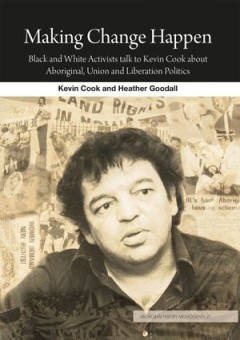
Making Change Happen: Black and White Activists talk to Kevin Cook about Abor…
This book is a unique window into a dynamic time in the politics and history of Australia. The two decades from 1970 to the Bicentennial in 1988 saw the emergence of a new landscape in Australian Indigenous politics. There were struggles, triumphs and defeats around land rights, community control of organisations, national coalitions and the international movement for Indigenous rights. The cha…
- Edition
- -
- ISBN/ISSN
- 9781921666728
- Collation
- -
- Series Title
- -
- Call Number
- 920 GOO m
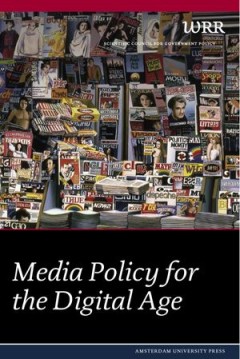
Media Policy for the Digital Age
Traditionally, the Netherlands has enjoyed being a test market for many ideas in the media. But over the last decade, progress has been severely hampered by lengthy discussions on the future structure of just one sector of media, namely public broadcasting via radio and television. The narrow approach results in a lot of paper, speeches and theories, but little in the way of definitive policy m…
- Edition
- -
- ISBN/ISSN
- -
- Collation
- -
- Series Title
- -
- Call Number
- -
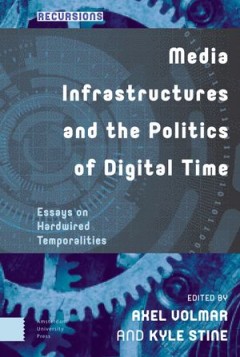
Media Infrastructures and the Politics of Digital Time Essays on Hardwired T…
Digital media everyday inscribe new patterns of time, promising instant communication, synchronous collaboration, intricate time management, and profound new advantages in speed. The essays in this volume reconsider these outward interfaces of convenience by calling attention to their supporting infrastructures, the networks of digital time that exert pressures of conformity and standardization…
- Edition
- -
- ISBN/ISSN
- 9789048550753
- Collation
- -
- Series Title
- -
- Call Number
- -
 Computer Science, Information & General Works
Computer Science, Information & General Works  Philosophy & Psychology
Philosophy & Psychology  Religion
Religion  Social Sciences
Social Sciences  Language
Language  Pure Science
Pure Science  Applied Sciences
Applied Sciences  Art & Recreation
Art & Recreation  Literature
Literature  History & Geography
History & Geography